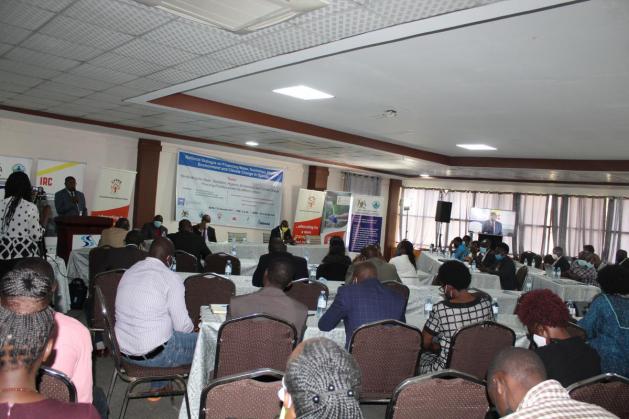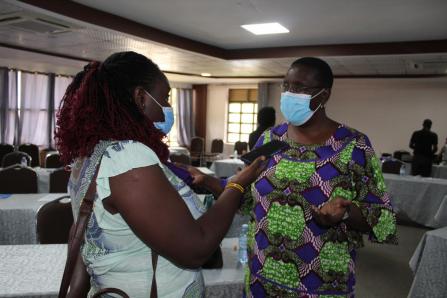Tackling Uganda's WASH, environment and climate change financing gap in Uganda.
Published on: 01/03/2022

Uganda’s socio-economic progress sits squarely on its natural environment resources as the core support for its industries, and water, sanitation and hygiene services for the livelihoods and quality of life of its people. Development experts recommend that deliberate and collaborative approaches to financing water, sanitation and hygiene services, environmental resources management, and climate change adaptability be adopted urgently if Uganda is to attain the desired socio-economic targets of its Vision 2040.
But only 32% of the population in Uganda has access to a basic water supply and 19% to basic sanitation, with about 7 million people still defecating in the open. Moreover, despite that 80% of the population depend on agriculture for their livelihood, the effects of climate change are now evident with shorter or longer unpredictable seasons of rainfall, spells of droughts, and heavy floods.
"There is no policy framework for financing Water, Sanitation, Hygiene, Environment and Climate Change Programmes in Uganda yet they contribute substantially to the national socio-economic development, they are often taken for granted, " Alfred Okidi, Permanent Secretary, Ministry of Water and Environment.
As such, a cross-sectoral national dialogue was on 17 December 2021 convened by the Ministry of Water and Environment (MWE) through the Water Resources Institute (WRI) in collaboration with the Civil Society Budget Advocacy Group (CSBAG), IRC, WaterAid and Water For People (WFP), to align and shape the conversation on financing the water and environment sector in Uganda.
“At IRC, we believe that services should be available, reliable, affordable to all people all the time – that’s a prerequisite to achieving Vision 2040 as a country. Finance is a key building block to get us there. Thank you, Ministry of Water and Environment for the opportunity to dialogue and collectively act to change the situation,” Jane Nabunnya Mulumba, IRC Uganda Country Director.
Themed Re-thinking Uganda’s WASH, Environment and Climate Change Financing Priorities beyond the COVID-19 Pandemic, the hybrid dialogue held in Kampala brought together over 180 professionals from government agencies, parliament, development partners, civil society, private sector, academia, and representatives of cultural institutions.
Partners emphasised that optimum benefit of water and environment resources can only be realised if every Ugandan is reached with quality service delivery.
“Our target is no less than everyone forever – every household, school, health facility, and community must have sustainable water and sanitation services to be able to contribute to the progress of our country,” Brenda Achiro Muthemba, Country Director Water For People.
Discussions were centred on analysing the challenges faced by the sector in delivering sustainable water, environment and climate change services for the Ugandan population and the opportunities for holistic financing. Presenters emphasised the interlinked roles and systems across distinct state and non-state agencies in WASH and environment resources service delivery, catalysing the apparent need for collaborative efforts to identify practical policy and interventions to address financing gaps and address climate change challenges.
According to senior economist Dr. Fred Muhumuza, the existing challenges are as vast as the opportunities that the sector can explore to triple investment in order to make the required contribution towards Uganda’s Vision 2040 and the global SDGs by 2030. In his key-note address, Muhumuza stressed the apparent need for the sector to demonstrate to financing institutions the efficacy of investing in quality services, good governance, development, and sustainable management of these resources to the social economic and political agenda of Uganda and its citizens.
“The challenge is partly in allocation. 99% of public financing for the sector through the national utilities and the Ministry of Water is centralised with only a minimal amount trickling down to the local governments where people directly expect services,” Fred Muhumuza, senior economist and keynote speaker at the national dialogue.
Uganda’s national budget landscape is complex and grossly constrained. Total expenditure for the financial year 2021/22 was planned at Shs.44,778.8 billion (US$ 12.5 billion) excluding domestic debt refinancing. But allocation for water, sanitation, hygiene, and environment is not only low but is also diminishing. The sector’s on-budget share of the national budget decreased from 4.03% (UGX 1,263bn (US$ 353M)) budget funding in the FY 2019/20 against the national budget of UGX 25,093bn (US$ 7bn) in the FY 2018/19 to 2.73% ( UGX 1,105.72bn (US$ 309M)) on budget funding in the FY 2019/20 against the national budget of UGX 40,489bn (US$ 11.3bn), according to the 2020 Sector Performance Report.
As nations the world over focus on economic recovery due to the COVID-19 impact, the sector in Uganda is grappling with increased interest rates on external resources and a political landscape that has prioritised hefty budgets for regional security at the expense of WASH and natural resources.
Global resource flows are diminishing, with adaptation financing to Africa projected to a mere US$ 66bn for 2020-2030. This is short of the US$ 331bn (or approximately US$ 33bn annually) in estimated needs per stated cost estimates in nationally determined contributions (NCDs). In East Africa, water received only 17% of the US$ 1.76bn in 2017-2018
Paradoxically, COVID-19 stimuli fell short on water, environment, and climate change, leading to a decline in private sector investment and overall impact on the economy.
Civil society advocates retaliated that while national resource envelopes may be constrained, Ugandans have the right to access services and the government the responsibility to deliver WASH and sustainable environment services. But the sector must put in more effort in positioning itself not only as viable but also as a critical sector.
“Who knew that a pandemic of the magnitude of COVID would come? But when it did, the money for response and action was found. Why not water and environment? You must be intentional in tapping into the available resources whether public or private to invest in the sector,” Julius Mukunda, Executive Director CSBAG.
Mukunda challenged government to ensure that the water points are functional and that information on funds available for the water department at local government level is displayed for accountability purposes.
There was consensus that COVID-19 has illuminated the importance of access to safe water and a clean environment for everyone. Investing in clean and safe water and improved sanitation facilities and hygiene practices can bring a return of 21 times their cost, according to a WaterAid report.
Uganda’s core industries namely agriculture, manufacturing, hydropower generation, marine transport, fisheries, waste discharge, tourism, and environmental conservation all depend on water.
But supply of safe water for domestic use remains low with rural areas at 71% and large towns at 79%. Similarly, water storage capacity for productive uses such as irrigation, livestock and other uses remains low. Increased investment in safe water and sanitation service delivery will reduce the disease burden, save productive time spent by women and youth on collecting water for home use and promote sector-based employment and wealth creation.
Increasingly, water, environmental and natural resources are suffering degradation due to increased demand for agricultural land, settlement, and infrastructure development. Well-managed wetlands, river-banks and forests will boost communities’ resilience to extreme weather events such as prolonged droughts and floods.
The dialogue was also an opportunity to articulate the intricacies of sustainability of services vis-à-vis the issues of affordability, operations and maintenance. While political representatives claim that communities are too poor to afford water bills, technocrats point to behavioural attitudes that push water users to undermine their duty to contribute to sustainable services through user fees. The point of agreement, however, was on the need to extend this conversation to those that are directly affected
“What is a green economy to a local person in my constituency? I challenge you experts to take this dialogue down to the people, explain climate change and sustainability in the language they understand and explain how they can benefit!" Dickson Kateshumbwa, Member of Parliament and serving on the Natural Resources Committee of Parliament.
The identified opportunities for financing water, sanitation, hygiene, environment and climate change include:

Water supply, sanitation and hygiene, and environment and natural resources are interlinked and require sustainable exploitation and management to ensure that there is adequate water of the right quality and quantity for both production and domestic use even during the dry seasons. Optimum yet sustainable utilisation of these resources is central to national development and therefore financing and investment should be intentional and adequate. It is paramount that existing national, regional and global legislation for the protection and sustainable use of these resources is implemented.
In the quest for financing, stakeholders are cautioned to be mindful of the safety of the ecosystem for posterity. “It is more expensive to restore wetlands than to protect what we have. Consider, is it cheaper to import sugar than to cut down a forest to plant sugar cane?” Fred Muhumuza, keynote speaker.
The dialogue made a number of recommendations for consideration by the relevant stakeholders as follows:
a) Ministry of Water and Environment
b) Ministry of Finance Planning and Economic Development
c) Budget and Natural resources Committees of Parliament